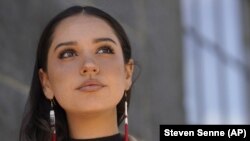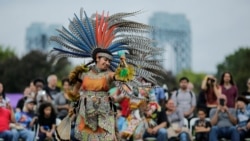When Samantha Maltais arrives at Harvard this autumn, she will be the first member of the Aquinnah Wampanoag tribe to attend its law school. In some ways, she will be joining an ancestor.
More than 350 years ago, an Aquinnah Wampanoag man named Caleb Cheeshahteaumuck became the first Native American to graduate from Harvard University. He attended because of its 1650 charter calling for the education of “English and Indian youth of this country.”
Maltais says she understands “Harvard’s impact” because she has always lived nearby. And she is the daughter of her tribe’s leader.
Harvard is “a symbol of New England’s colonial past, this tool of assimilation that pushed Native Americans into the background in their own homelands,” she said.
Maltais will arrive on campus at a time when Native American tribes, students and University teachers and officials are pushing the famous university and other colleges to do more for Indigenous communities. Many feel the schools need to admit their past wrongs. It is similar to the call for states and other communities to admit to the wrongs of slavery and discrimination against Black people.
Calls for return of lands, lower costs
In Minnesota, 11 tribes have called on the state university system to return some of the lands taken from tribes. They have also asked for Native American students to attend without payment and to increase the number of Native Americans in the administration.
Tadd Johnson is the University of Minnesota’s director of tribal relations and a Chippewa tribe member. He said the university will create a “truth and reconciliation” process to investigate the historical wrongs and find ways to correct them.
“We’re listening,” he said, adding the university system is acting on “everything that has been thrown at us.”
Meanwhile in Colorado, state lawmakers are considering legislation to permit students from certain tribes to pay much less to attend the state university system.
And in California, Native American students also want lower costs. Most California state schools have released statements that admitted their past wrongs against Native Americans and their lands. Tori McConnell is a 21-year-old member of the Yurok Tribe who graduates from the University of California, Davis in June.
“It’s only right that they do these things,” she said. “Actions speak louder than words.”
University spokesperson Ryan King said officials are working hard to continue supporting Native students and tribal communities. He pointed out that the school created an advisory board that includes tribal leaders and others.
Looking to change the future
Many American universities are a product of an 1862 law that paid for the creation of public universities through the sale of federal government land. But a study found that much of that land had been taken from about 250 tribes of Native Americans.
At the Massachusetts Institute of Technology, or MIT, near Harvard, Native American students looked into the school’s past as one of the original federal land universities.
Luke Bastian is a 22-year-old Navajo student from Phoenix. He says he and other students presented the results of their class project to MIT’s president earlier this month. The students also asked him to create a Native American studies program.
University officials say conversations with Native students continue. Bastian believes they will make progress. Native American students asked for, and received, a meeting place for themselves, say Indigenous community backers.
South Dakota State University uses private donations to provide scholarships to local tribal members. It also uses money earned from the land to improve Native American programming, research and other efforts.
“We can’t change the past, but we can change the future for these young people,” says Barry Dunn. He is the university’s president and a member of the Rosebud Sioux Tribe who started the Wokini Initiative in 2017.
Native Americans have the lowest graduation rates in the country, said Cheryl Crazy Bull. She added that the pandemic has made it even harder for Native American students. She is president of the American Indian College Fund, which awarded Maltais her scholarship.
At Harvard, there is a concern that Native students are being asked to withdraw from the school for poor grades at higher rates than other students, said Emily Van Dyke. She is president of Harvard’s Native American alumni group.
Students and alumni are also pushing Harvard to admit that it stands on land where Indigenous peoples once lived, Van Dyke said. MIT and the University of California, Davis have both admitted to being on land once owned by Native Americans.
Harvard spokespeople refused to comment.
However, Joseph Gone heads the school’s Native American program. He said the university is in talks with local tribes and plans to release a statement in the future.
For her part, Maltais says Harvard and other schools should help Native students coming from distant tribal communities adjust to university life with counseling and other services. She also supports the idea of free education for Native Americans, but thinks it is not enough.
“Sometimes the only reparation for land is land,” she said.
I’m Susan Shand.
The Associated Press reported this story. Susan Shand adapted it for Learning English. Hai Do was the editor.
____________________________________________________________
Words in This Story
youth - n. someone who is young
impact - n. a powerful or major influence or effect
assimilation - n. to cause (a person or group) to become part of a different society, country,
indigenous - adj. produced, living, or existing naturally in a particular region or environment
reconciliation - n. the act of causing two people or groups to become friendly again after an argument or disagreement
scholarship - n. an amount of money that is given by a school, an organization, etc., to a student to help pay for the student's education
alumni - n. someone who was a student at a particular school, college, or university
adjust - v. to change in order to work or do better in a new situation
reparation - n. something that is done or given as a way of correcting a mistake that you have made or a bad situation that you have caused
We want to hear from you. Write to us in the Comments Section, and visit our Facebook page.






